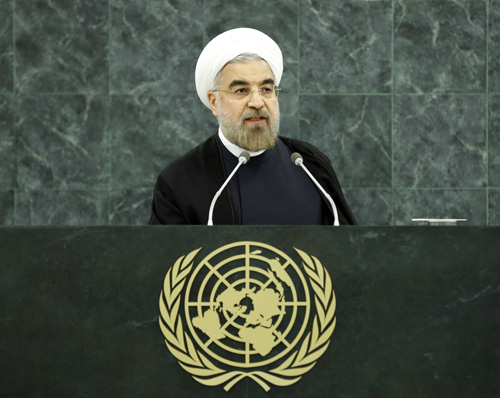
Hassan Rouhani, President of Iran, UN General Assembly, UN Photo/Sarah Fretwell
The pre-government shut down news cycle was obsessed with last week's address to the United Nations General Assembly by Iran's new president, Hassan Rouhani, the handshake with Barack Obama that didn't happen and finally their 15-minute phone conversation.
The two presidents appeared to be inching toward a deal to diplomatically settle the issues of Iran's nuclear ambitions which many believe uses the cover of a civilian nuclear power program in order to develop an arsenal of nuclear weapons.
The prospects of an accommodation with Iran drew Israel's Prime Minister Binyamin Netanyahu to New York to "tell the truth in the face of the sweet talk and the blitz of smiles," he said. He warned the General Assembly that the Iranian president was "a wolf in sheep's clothing."
Clearly the economic sanctions imposed on Iran have taken a bite and President Rouhani is on a mission to have them lifted. But what will it take to gain the confidence of the United States and the group of countries working together on the diplomatic front (the so-called P5+1, the U.S., the U.K., France, China, Russia and Germany), and especially Israel?
A good first step would be to answer the ongoing questions about research and work Iran has done on aspects of nuclear weapons technology. The International Atomic Energy Agency (IAEA) has pressed Iran for years to clear up questions about the military aspects of its nuclear efforts. Iran has left many unanswered.
One major question involves experiments with a neutron generator and uranium deuteride -- this is what might be called a trigger for a nuclear explosion. The agency believes Iranian scientists worked on this particular piece of technology for as many as four years, perhaps longer.
This particular piece is important because it doesn't have any other uses that really are legitimate or credible. If this is true, it will also show that Iran is working on fairly sophisticated components of a nuclear weapon. According to experts, there is a much simpler way to do it but if you want to do it more secretly, you may want to use the route of an uranium deuteride neutron initiator.
The IAEA does not assert that Iran is currently engaged in this work -- only that it suspects Iranian scientists did the work before and may have continued it in some capacity.
Last year, the Director General of the IAEA, Yukiya Amano, said, "the activities in Iran related to the possible military dimension seem to have been continued until recently."
Iranian officials claim that the IAEA's questions and concerns are based on fabricated documents.
The Iranian government knows that the IAEA could not have learned about the suspected research from their regular inspections. Some of its information is likely to have been partially derived from the covert operations carried out by the United States and others. The Agency will only say that it acquired the information from "many member States and through its own efforts."
It's irrelevant to focus on how the IAEA learned about these purported activities. What is relevant is that Iran has repeatedly refused to clear up "all outstanding issues in order to exclude the existence of possible military dimensions to its nuclear program," according to the IAEA.
The Agency says Iran must do this in order to restore international confidence and prove that its nuclear programs are exclusively for peaceful purposes. Last Friday they met with Iranian officials for the 11th time since last year and once again failed to make any significant progress toward resolving these issues.
Some experts warn that the clock is ticking on the Iran Nuclear Research Reactor (IR-40) under construction in Arak, which could be used to create weapons grade plutonium that could be diverted. The Agency has repeatedly been rebuffed when it sought design information from Iran that would allow it to implement a "safeguards approach." The IAEA goal is to make sure all diversion paths are monitored. In his speech at the UN, Prime Minister Netanyahu demanded that all work stop on the Arak reactor. It's not clear if Israel will allow that reactor to come online.
These and other unanswered questions including work on nuclear payloads for missiles makes it impossible for the agency to certify the "peaceful nature of Iran's nuclear program."
"If this is a peaceful program, there should be nothing to hide," said Marie Harf, US State Department, Deputy Spokesperson.
Iran's past unwillingness to come clean on these and other issues has been a roadblock to ending the covert war to stop Iran's bomb and lifting the sanctions which became, in effect, the primary tools of U.S. policy toward Iran. The ball's in Iran's court. It's time to answer the questions.
Iran's next chance to follow up with concrete actions comes when their delegation meets with the P5+1 in Geneva later this month (October 15 &16) and with IAEA in November.
